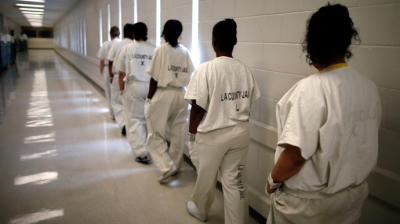Women facing violence in prison deserve better

Every social movement has advocates on each side of the issue offering critiques and ideas that could change the tide of public opinion. This is certainly true of the women's movement in the United States.
Regardless of your ideals and what side of the debate you take, it is undeniable that this movement has informed and educated our society on issues of trauma, domestic violence and abuse.
In 1968, one in five Americans surveyed in a Harris poll said that they would approve of slapping one's spouse "on appropriate occasions." At the same time the national poll captured this attitude, the battered women's movement was emerging and bringing awareness to some of the horrors going on behind closed doors in some American households.
This movement succeeded in creating domestic violence shelters, hotlines and crisis services all over the nation to advocate on behalf of abuse survivors. As a result, the polling responses given in 1968 would be difficult to replicate today, if for no other reason than the answer in favor of slapping one's spouse would no longer be a socially desirable response.
Another outcome of the women's movement was the acknowledgment that there are real differences in victimization rates based on biological sex. While no abuse is acceptable, these differences should not be ignored. According to the CDC, roughly 44% of women have experienced a form of sexual violence in their lifetime, compared to an estimated 25% of men. Twenty-one percent of American women — 25.5 million — have experienced a completed or attempted rape, compared to 2.6% of men.
Despite these documented differences, we live in a time when some policymakers are seemingly indifferent to the current statistics and the social conditions that staged the battered women's movement. In recent days, states like Washington and California have allowed biological male prisoners to identify as female and receive a transfer to a women's prison — regardless of the nature of their crimes.
What happened to the concept of malingering? In clinical psychology, malingering is defined as "falsification or profound exaggeration of illness (physical or mental) to gain external benefits" (e.g., getting out of work, seeking attention, leaving school).
We certainly don't hear about these states making any effort to screen prisoners for malingering or to better understand their motivation for their request to be moved to a women's prison. If a screening process exists, how is it that convicted serial killers and rapists can be housed with women who have a high probability of being abuse survivors?
How can anyone in policy or prison leadership claim to have familiarity with a trauma-informed perspective even as they insist on housing biologically male prisoners with a population known to experience higher levels of interpersonal trauma (i.e., sexual abuse, physical violence) than the general population?
As one recent study noted, incarcerated women have much higher prevalence rates of adverse (traumatic) childhood experiences and exposure to trauma throughout their lives than women in the general population. This study also cited research that found the rate of childhood trauma and victimization among incarcerated women was higher than incarcerated men.
Preferring the newly-minted trans identity of a few biological males at the expense of a large number of women who likely have a history of abuse and trauma is an example of how the "system" can be an enabler of victimization. This is not to project innocence where women have committed crimes. However, most Americans don't want the price of justice to include inhumane conditions in which women are being held in cells with biological males whose crimes are the same as their childhood nightmare.
As we approach the one-year anniversary of the Biden administration, the president seems more focused on pushing the transgender agenda wherever he can rather than dealing with the many crises engulfing our country and our globe. Thankfully, Sen. Tom Cotton, R-Ark., has recognized the harm these policies would bring to women, and has proposed a bill that would halt the Biden administration's proposal to transfer biological males to women's prisons. Cotton's bill would also cut off funding to states that do not comply with this basic protection. It is a welcome bill that should be supported.
Allowing biological men to request transfers to women's prisons is a misogynistic policy and yet another attempt at the erasure of biological women. This harmful policy must be opposed wherever it arises.
Originally published at the Family Research Council.
Dr. Jennifer Bauwens serves as Director of the Center for Family Studies at Family Research Council. In her role, she researches and advocates for policies that will best serve the health and well-being of families and communities.




























